
Who knew the foods we ate play a direct role in our gut health, the way we feel and most importantly, our brain health? Well… tons of science, actually 😉 I’ve gathered together my top 10 favorite brain-boosting foods (not in any particular order) for you to start incorporating more into your diet! For the most part, these foods do a great job in fighting inflammation, are packed with antioxidants, vitamins, good healthy fats, minerals and micronutrients. In no specific order…
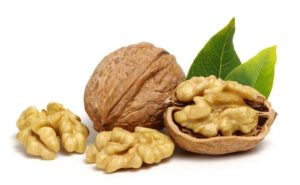
1. Walnuts
Walnuts are a great source of healthy fats: monounsaturated, polyunsaturated and omega-3 fatty acids– those found to play a critical role in the development and function of the central nervous system. Omega 3 fatty acids are considered “essential” because our body cannot produce them on our own. It’s essential we get them through our diet. They also contain iron, selenium, zinc, vitamin E (found to help ward off Alzheimer’s), and some B vitamins. They are linked with lower blood pressure & cholesterol levels. A handful of walnuts is a perfect snack anytime of day!
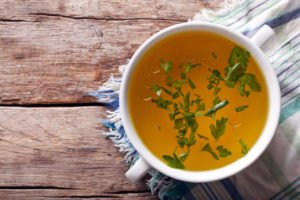
2. Bone Broth
Bone broth is chalk full of nutrients– 7-10g protein per cup, gelatin (think smooth & supple skin, healthy hair and nails), glycine (supports the liver), glutathione (powerful antioxidant) and other key amino acids that help reduce inflammation.
It’s been used for centuries as a natural healer and has recently been on the rise for its popularity & health benefits. Bone broth contains nutrients we don’t get enough of- calcium, phosphorus, magnesium, and potassium. It’s great for boosting the immune system as well! An all-over health food and wonderful addition to any diet.
*Listen to this podcast on bone broth– https://feed.pippa.io/public/shows/5aecaca3a15c2dd12887881a

3. Extra Virgin Olive Oil
Easily one of my favorites on this list and what I try to incorporate into my diet every single day, extra virgin olive oil, or EVOO, is a monounsaturated fatty acid and is considered quite the brain food. liquid at room temp. Protects memory and learning ability. Oleic acid found in evoo is found to reduce markers of inflammation (source). Other benefits include reduced risk of cardiovascular disease, high blood pressure, stroke, among others. Further, a Mediterranean-style diet, where olive oil is consumed in high demand, has been shown to promote cognitive function and may just help protect your brain from Alzheimer’s disease.
My favorite extra virgin olive oil is Kouzini Greek olive oil.
*Listen to this podcast on evoo and how to pick the best kind– https://thegeniuslife.libsyn.com/rss
Sources:
https://www.ncbi.nlm.nih.gov/pubmed/23670794
https://www.ahajournals.org/

4. Dark Chocolate (Cacao)
No, i’m not just talking about any generic chocolate bar at the store. It needs to come from a good quality source or you’re probably doing much more harm than good with all those processed, added sugars. Stick to the saying, “the darker or more cacao percentage, the more benefits.” My gold standard is 72% or above for substantial benefits, like flavanols. Flavanols have antioxidant and anti-inflammatory properties and can help improve blood flow to the heart and brain. Also keep in mind the type of sugar in your chocolate bar– natural sugars like coconut sugar/nectar, honey and maple syrup are best 🙂
Overall, dark chocolate is a powerful source of antioxidants, including polyphenols, flavanols, and cetachins. Further, it’s rich in iron, copper, zinc, magnesium, and phosphorous. Click here for more info on cacao.
*My favorite brands of chocolate include Eating Evolved, Loving Earth & Hu Kitchen 🙂
Sources:
https://www.ncbi.nlm.nih.gov/pubmed/16794461
https://www.ncbi.nlm.nih.gov/pubmed/22892813
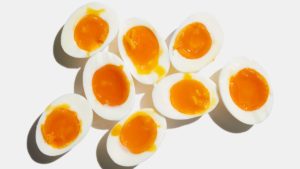
5. Egg Yolks
Eggs are an amazing source of nutrition and always seem to be included in my diet. More specifically, the yolks are especially rich in choline, a vital nutrient that helps in fetal brain development while in the womb. Choline is necessary for the structural integrity of our cells, heart health, proper functioning of our liver and as mentioned before, plays a huge role in our cognitive health. Unfortunately, most Americans are deficient in this key nutrient.
Eggs also contain lutein, which penetrates the blood-brain barrier and accumulates in the brain regions that are responsible for preserving healthy cognitive function during aging. Lutein has neuroprotective effects as an antioxidant.
If you’re a vegetarian and don’t eat eggs, it’s important to think about supplementing with choline. If you do eat eggs, don’t skip out on the yolks!! They’re the best part. 2 large egg yolks provide a little over 230 mg of choline, about half your daily needs. Also make sure you’re buying organic, pasture-raised eggs.
Sources:
https://www.ncbi.nlm.nih.gov/pubmed/?term=Parahippocampal+Cortex+Mediates+the+Relationship+between+Lutein+and+Crystallized+Intelligence+in+Healthy%2C+Older+Adults
https://lpi.oregonstate.edu/mic/other-nutrients/choline
https://www.ncbi.nlm.nih.gov/pmc/articles/PMC2782876/
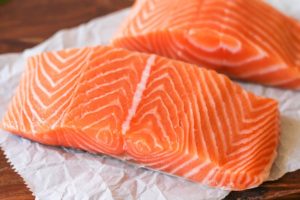
6. Salmon
Wild-caught salmon is a big one for boosting brain health. More than ⅔ of the brains fatty acids are docosahexaenoic acid, or DHA, which is an omega 3 fatty acid found primarily in oily/fatty fish like salmon. Studies have shown that long-term consumption of adequate DHA is linked to improved memory, improved learning ability and reduced rates of cognitive decline.
*pay attention to what type of salmon you’re buying. Alaskan, wild-caught will offer the most benefits whereas farm-raised raises concern about quality. You’ll especially notice a difference in color between the two! Wild-caught tends to be a deeper/darker orange, containing more nutrients.
Fatty fish in general is a great option for brain health. Salmon, cod, haddock, tuna or halibut are good sources several times per week.
*If you don’t eat fish, or don’t eat enough fish, try out my favorite fish oil supplement here.
Sources:
https://www.nature.com/articles/ncomms8934
https://www.eatright.org/health/wellness/healthy-aging/brain-health-and-fish
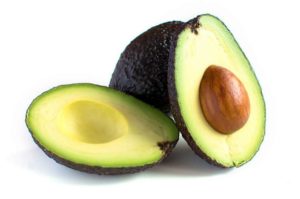
7. Avocado
I can’t say enough good things about avocado. They’re not only a great source of fiber, but also packed with monounsaturated fat, promoting blood flow to the brain and is anti-inflammatory (source)
A good dose of avocado is full of folate and vitamin K, both of which are shown to prevent blood clots as well as help improve cognitive function. In addition to these vitamins, potassium is also present, and shown to lower blood pressure. Click here to head to my avocados 101 blog post for more info.
Avocados are also rich in glutathione, a powerful antioxidant that helps prevent free radical damage in the body, as well as containing a number of bioactive phytochemicals including carotenoids, terpenoids, D-mannoheptulose, persenone A and B, phenols, and glutathione that have been reported to have anti-carcinogenic properties (source)
Sources:
https://www.nature.com/articles/ncomms8934
https://lpi.oregonstate.edu/mic/vitamins/vitamin-K
https://lpi.oregonstate.edu/mic/minerals/potassium
Photo credit: Grounder
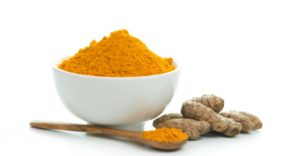
8. Turmeric:
Curcumin is the main active ingredient found in turmeric and contains very powerful anti-inflammatory properties. It’s great for the immune system and helps with improving your brain’s oxygen intake. Fun fact: when you pair turmeric with black pepper, you increase the bioavailability of curcumin in the body.
Other benefits of of curcumin include increased memory & cognitive function and prevention of inflammation and oxidative damage, a key driver in the development of alzheimer’s disease.
Turmeric can be used as a daily supplement (I like this one or this one), in golden elixirs (try this premade mix out, my favorite!), added to soups or in bone broth like my favorite recipe here, seasoned into roasted veggies, snuck into smoothies (only need about 1/4 tsp & won’t taste. Don’t forget the shake of black pepper!), and the list goes on.
Sources:
https://www.ncbi.nlm.nih.gov/pmc/articles/PMC3281036/
https://www.sciencedirect.com/science/article/pii/S0006899306027144
https://onlinelibrary.wiley.com/doi/full/10.1111/j.1755-5949.2010.00147.x
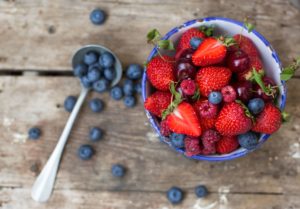
9. Berries
Berries are in the low-glycemic bracket of fruits, those that are digested more slowly & have a lower effect on blood glucose levels. Berries are rich in antioxidants, helping to neutralize free radicals in the body. These antioxidants include anthocyanins, ellagic acid and resveratrol and are found to help protect cells and reduce risk of disease (source). Studies show these antioxidants may even help protect against cancer! Other benefits include age related memory loss, boosting blood flow and oxygen to the brain, improving concentration and short term memory, and improving mood and mental health. I love incorporating blueberries into morning smoothie every day!
Sources:
https://www.acs.org/content/acs/en/pressroom/presspacs/2012/acs-presspac-march-7-2012/strong-scientific-evidence-that-eating-berries-benefits-the-brain.html
https://www.ncbi.nlm.nih.gov/pubmed/19057194
https://www.ncbi.nlm.nih.gov/pmc/articles/PMC2850944/
https://www.ncbi.nlm.nih.gov/pubmed/26501271
https://www.sciencedirect.com/science/article/pii/S0963996911002572
https://www.ncbi.nlm.nih.gov/pubmed/25788047
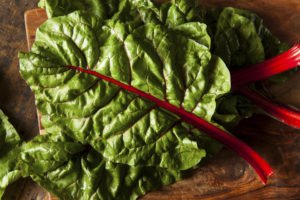
10. Leafy, Green Vegetables
Leafy greens are something I always promote having everyday. If you’re not a big fan of greens, there are tons of ways to sneak them in without knowing (smoothies, chunky sauces, soups, etc.). Whenever I build my lunch and dinner plate at home I love starting with two big handfuls of mixed greens and go off of that. There are dozens of benefits to incorporating more leafy green veggies into your daily life. For instance, they are rich in nutrients like folate, lutein, B-carotene, and vitamin E, which are correlated to better brain power. This study found that older people who had one or more servings of leafy greens per day experienced a slower rate of decline on tests of memory and thinking skills than did people who rarely or never ate these vegetables. Most dark leafy greens are chalk full of vitamins A & K, which both help fight inflammation and maintain bone health.
Sources:
https://www.ncbi.nlm.nih.gov/pubmed/29263222
https://www.ncbi.nlm.nih.gov/pubmed/29263222
http://n.neurology.org/content/90/3/e214
https://www.sciencedaily.com/releases/2015/03/150330112227.htm
https://www.ncbi.nlm.nih.gov/pmc/articles/PMC533861/
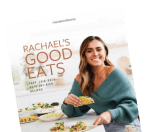


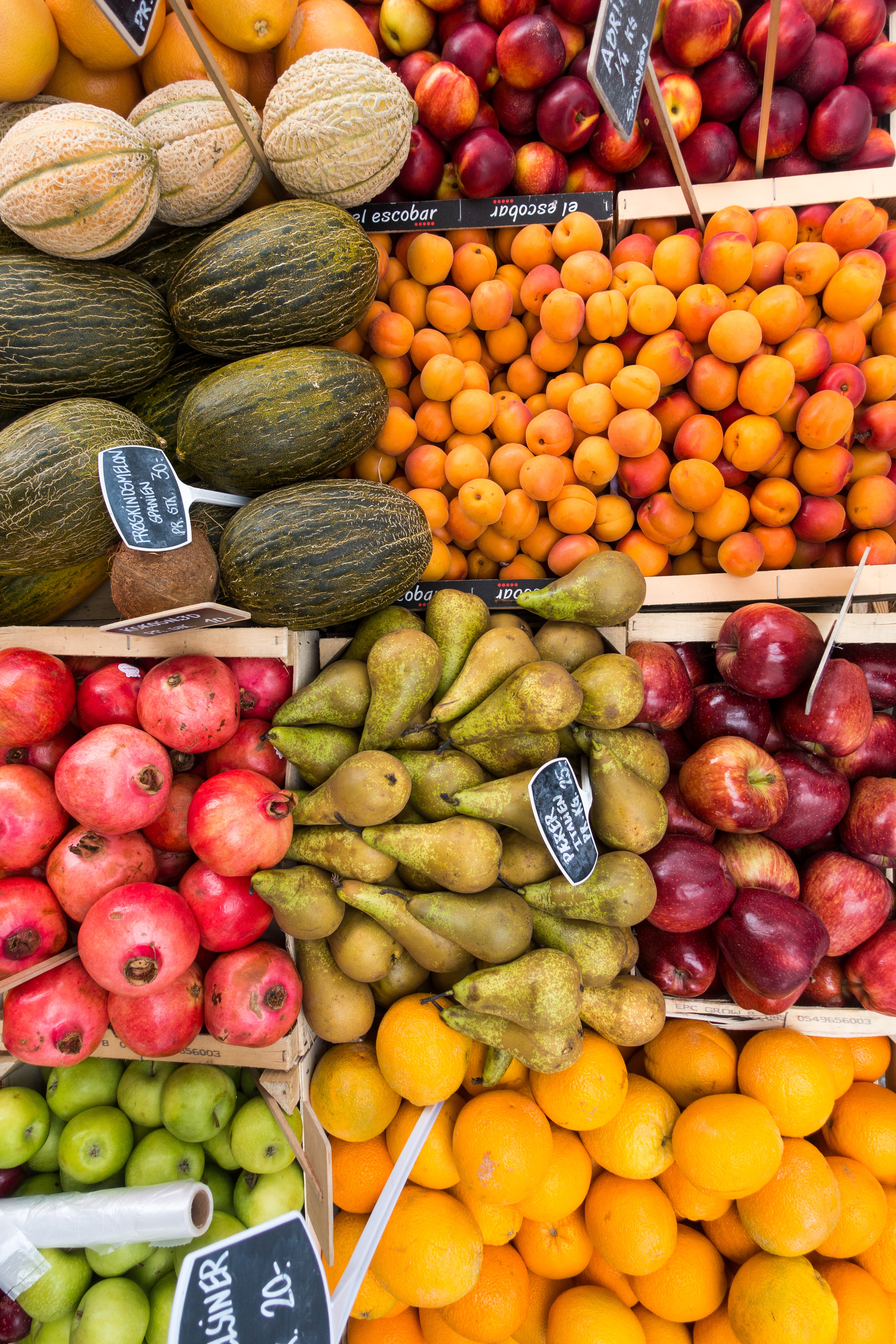

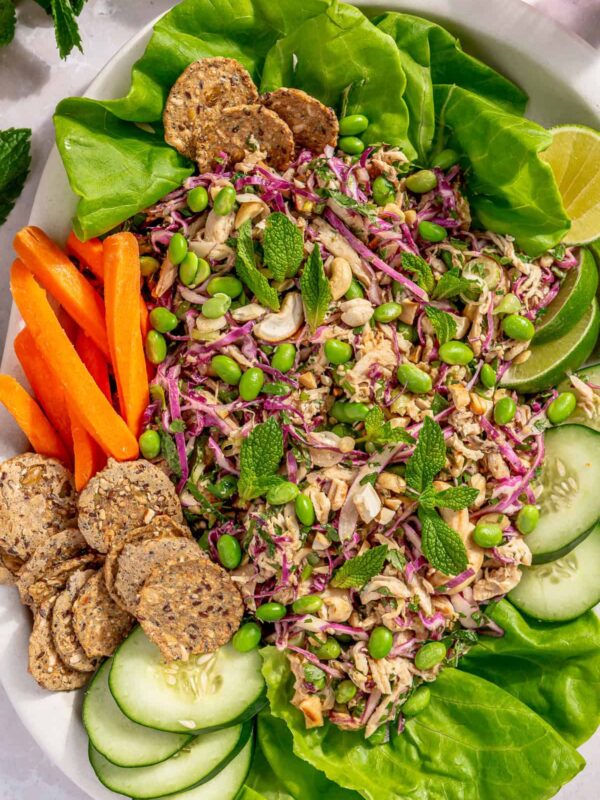








Thanks a lot for sharing this insightful post. Keep sharing more like this.
Although depression & anxiety are distinct diagnoses, they both can be treated successfully using a holistic approach that integrates modern medicine with natural therapies. Maintain a healthy lifestyle and eat foods like fatty fish and blueberries to keep your brain working on top condition.
My mother taught me about dark chocolate that boosts the brain power and she’s actually right. Thank you for this helpful information.
WOW! This article really useful for me. I confused for choosing the hair and brain foods information what would be the best for everything. But review this article my confusion has cleared. Thanks a lot for sharing such an informative article about 10 Foods To Boost Brain Health and I’m sure most people can take notes from this article. One thing most people lack experience while aware of healthy brain. Well, this post will give me much good ideas for healthy brain and hair. Thanks Rachael and keep it up…….
How do you use tumeric? Can you take it as a daily supplement?
Yes! I just added to the post with a few links 🙂
Hi Rachel,
This article is great! Thank you! Do you have a favorite brand of chocolate?
I second this chocolate question! 🙂
Just added to the post with my 3 favorites 🙂
Yes! Eating Evolved, Loving Earth & Hu Kitchen 🙂
Good thing I eat all those 🙂